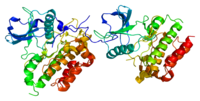
Photo from wikipedia
Background and purpose Diabetes reduces the levels of hematopoietic stem/progenitor cells (HSPCs), which can contribute to organ and tissue homeostasis. Among patients with diabetes, lower HSPC levels predict the development… Click to show full abstract
Background and purpose Diabetes reduces the levels of hematopoietic stem/progenitor cells (HSPCs), which can contribute to organ and tissue homeostasis. Among patients with diabetes, lower HSPC levels predict the development or worsening of micro- and macro-angiopathy. High glucose variability is also associated with diabetic complications and we have previously shown that acute hypoglycaemia can stimulate stem/progenitor cells. Thus, we evaluated the relationship between glucose variability or time in hypoglycaemia and HSPCs in patients with type 1 diabetes (T1D). Methods Patients with T1D were compared to healthy subjects. HSPCs (CD34 + , CD133 + , CD34 + CD133 + , CD34 + CD45 dim ) were quantified by flow cytometry. Using flash glucose monitoring system for 90 days, we calculated several measures of glucose variability and time in hypoglycaemia. Results Forty-four patients with T1D and 44 healthy subjects were enrolled. Compared to healthy controls, T1D patients had significantly lower levels of HSPCs and duration of diabetes was inversely correlated with HSPC levels. Significant direct correlations were found between HSPC levels and the coefficient of variation of glucose levels or time in hypoglycaemia, which were stronger in patients with short-term than in those with long-standing diabetes. Conclusion This study confirms the pauperization of HSPCs in T1D patients and demonstrates a potential HSPC-stimulatory effect of hypoglycaemia, which mitigates with long-lasting diabetes. These data are consistent with a model whereby disease chronicity progressively blunts the release of HSPCs in response to adrenergic triggers, like hypoglycaemic events.
Journal Title: Journal of Endocrinological Investigation
Year Published: 2020
Link to full text (if available)
Share on Social Media: Sign Up to like & get
recommendations!